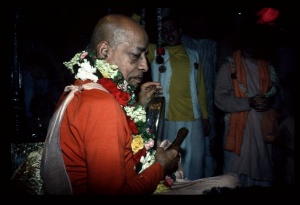CC Madhya 21.113: Difference between revisions
m (1 revision(s)) |
No edit summary |
||
| Line 1: | Line 1: | ||
{{ | [[Category:Sri Caitanya-caritamrta - Madhya-lila Chapter 21|C113]] | ||
<div style="float:left">'''[[Sri Caitanya-caritamrta|Śrī Caitanya-caritāmṛta]] - [[CC Madhya|Madhya-līlā]] - [[CC Madhya 21|Chapter 21: The Opulence and Sweetness of Lord Śrī Kṛṣṇa]]'''</div> | |||
<div style="float:right">[[File:Go-previous.png|link=CC Madhya 21.112|Madhya-līlā 21.112]] '''[[CC Madhya 21.112|Madhya-līlā 21.112]] - [[CC Madhya 21.114|Madhya-līlā 21.114]]''' [[File:Go-next.png|link=CC Madhya 21.114|Madhya-līlā 21.114]]</div> | |||
{{CompareVersions|CC|Madhya 21.113|CC 1975|CC 1996}} | |||
{{RandomImage}} | |||
==== TEXT 113 ==== | ==== TEXT 113 ==== | ||
<div | <div class="verse"> | ||
tāruṇyāmṛta—pārāvāra, taraṅga—lāvaṇya-sāra, | :tāruṇyāmṛta—pārāvāra, taraṅga—lāvaṇya-sāra, | ||
tāte se āvarta bhāvodgama | :tāte se āvarta bhāvodgama | ||
vaṁśī-dhvani—cakravāta, nārīra mana—tṛṇa-pāta, | :vaṁśī-dhvani—cakravāta, nārīra mana—tṛṇa-pāta, | ||
tāhā ḍubāya, nā haya udgama | :tāhā ḍubāya, nā haya udgama | ||
</div> | </div> | ||
| Line 14: | Line 18: | ||
==== SYNONYMS ==== | ==== SYNONYMS ==== | ||
<div | <div class="synonyms"> | ||
tāruṇya- | ''tāruṇya-amṛta''—eternal youth; ''pārāvāra''—like a great ocean; ''taraṅga''—waves; ''lāvaṇya-sāra''—the essence of bodily beauty; ''tāte''—in that ocean; ''se''—that; ''āvarta''—like a whirlpool; ''bhāva-udgama''—awakening of different ecstatic emotions; ''vaṁśī-dhvani''—the vibration of the flute; ''cakravāta''—a whirlwind; ''nārīra''—of the women; ''mana''—the minds; ''tṛṇa-pāta''—leaves of grass; ''tāhā''—that; ''ḍubāya''—plunge down; ''nā haya udgama''—never to come up again. | ||
</div> | </div> | ||
| Line 21: | Line 25: | ||
==== TRANSLATION ==== | ==== TRANSLATION ==== | ||
<div | <div class="translation"> | ||
“The bodily beauty of Śrī Kṛṣṇa is like a wave in the ocean of eternal youth. In that great ocean is the whirlpool of the awakening of ecstatic love. The vibration of Kṛṣṇa’s flute is like a whirlwind, and the flickering minds of the gopīs are like straws and dry leaves. After they fall down in the whirlwind, they never rise again but remain eternally at the lotus feet of Kṛṣṇa. | “The bodily beauty of Śrī Kṛṣṇa is like a wave in the ocean of eternal youth. In that great ocean is the whirlpool of the awakening of ecstatic love. The vibration of Kṛṣṇa’s flute is like a whirlwind, and the flickering minds of the gopīs are like straws and dry leaves. After they fall down in the whirlwind, they never rise again but remain eternally at the lotus feet of Kṛṣṇa. | ||
</div> | </div> | ||
__NOTOC__ | |||
<div style="float:right; clear:both;">[[File:Go-previous.png|link=CC Madhya 21.112|Madhya-līlā 21.112]] '''[[CC Madhya 21.112|Madhya-līlā 21.112]] - [[CC Madhya 21.114|Madhya-līlā 21.114]]''' [[File:Go-next.png|link=CC Madhya 21.114|Madhya-līlā 21.114]]</div> | |||
__NOTOC__ | |||
__NOEDITSECTION__ | |||
Revision as of 04:15, 9 September 2021

A.C. Bhaktivedanta Swami Prabhupada
TEXT 113
- tāruṇyāmṛta—pārāvāra, taraṅga—lāvaṇya-sāra,
- tāte se āvarta bhāvodgama
- vaṁśī-dhvani—cakravāta, nārīra mana—tṛṇa-pāta,
- tāhā ḍubāya, nā haya udgama
SYNONYMS
tāruṇya-amṛta—eternal youth; pārāvāra—like a great ocean; taraṅga—waves; lāvaṇya-sāra—the essence of bodily beauty; tāte—in that ocean; se—that; āvarta—like a whirlpool; bhāva-udgama—awakening of different ecstatic emotions; vaṁśī-dhvani—the vibration of the flute; cakravāta—a whirlwind; nārīra—of the women; mana—the minds; tṛṇa-pāta—leaves of grass; tāhā—that; ḍubāya—plunge down; nā haya udgama—never to come up again.
TRANSLATION
“The bodily beauty of Śrī Kṛṣṇa is like a wave in the ocean of eternal youth. In that great ocean is the whirlpool of the awakening of ecstatic love. The vibration of Kṛṣṇa’s flute is like a whirlwind, and the flickering minds of the gopīs are like straws and dry leaves. After they fall down in the whirlwind, they never rise again but remain eternally at the lotus feet of Kṛṣṇa.